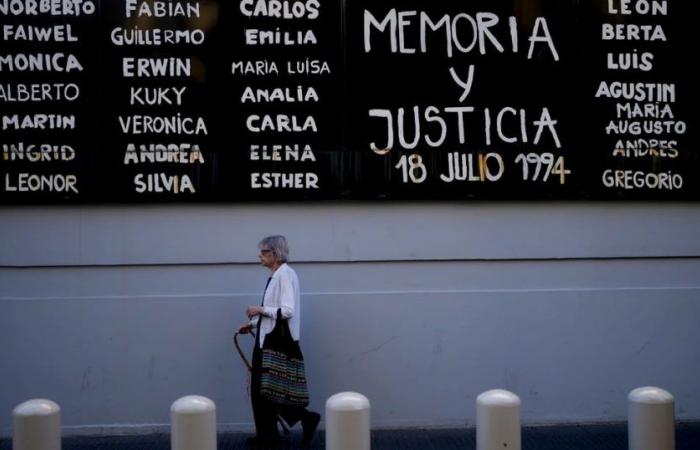The Inter-American Court of Human Rights will define this Friday, June 14, whether it condemns the Argentine State for the AMIA case, for the lack of clarification and the corruption that surrounded the investigation of the attack against the AMIA, that on July 18, 1994 killed 85 people. The lawsuit was promoted by the relatives of the victims who make up Memoria Activa, accompanied by the Center for Legal and Social Studies (CELS). And two years ago, the Government of Alberto Fernández recognized its responsibility in the events on those stands.
Since then, the Inter-American Court has been in a position to give a verdict that could include financial reparations and directives to redirect the investigation. The decision is known one month after 30 years of that tragic explosion at the headquarters of the Jewish mutual society. Precisely, last April, the Federal Court of Criminal Cassation issued two key rulings in this case.
On the one hand, it confirmed the majority of the sentences for the serious irregularities committed at the beginning of the investigation of the attack, although it modified the sentences in some cases and in others the crime investigated. Former judge Galeano was sentenced to four years, while the sentence for former prosecutors Eamon Müllen and José Barbaccia was two years in prison. On the other hand, he confirmed the acquittal of the car driver Carlos Telleldín in a ruling in which the vote of Judge Carlos Mahiques maintained that the attack against the Israeli embassy in March 1992 and the bomb that exploded the headquarters of the AMIA on July 18, 1994 ““They responded to a political and strategic design” of the Islamic Republic of Iran and both attacks were carried out by the terrorist organization Hezbollah. The ruling further held that The blowing up of the AMIA was a crime against humanity and opened the door for Argentina formally sues Iran.
On July 18, 1994, at 9:53, A car bomb went up the sidewalk and hit the front of the AMIA building, in Pasteur 633. The Trafic van had in the van, between the seats and the rear wheel wells, a combination of ammonium nitrate – with the addition to enhance the level of aluminum destruction -, a heavy hydrocarbon, trinitrotoluene (TNT) and nitroglycerin. The explosive charge was similar to about 300 or 400 kilos of TNT. The attack killed 85 people.
Memoria Activa had denounced in 1999 together with CELS and the Center for Justice and International Law (CEJIL) before the Inter-American Commission on Human Rights (IACHR), the violation of the rights to life, physical integrity, judicial and effective judicial protection.
And just days before the 11th anniversary of the attack on the Jewish mutual fund, the then president Nestor Kirchner signed decree 812/05 in which it recognized the responsibility of the Argentine State for not having clarified or prevented the terrorist attack and committed to carrying out a series of measures to fulfill its obligations. “Governments passed, but no one fulfilled them,” Memoria Activa said in March. In 2021, the IACHR elevates the case “Active Memory against the Argentine State” to the Inter-American Court of Human Rights, due to the failure of the Argentine State to comply with the recommendations of the IACHR.”
Néstor Kirchner’s decree was signed after the ruling of the Federal Oral Court 3 that, in 2004, acquitted all those accused of being part of the local connection, after denouncing a series of crimes that had occurred during the investigation of the case by the blasting There agents from the then SIDE confirmed that they had paid the car reducer Carlos Telleldin 400 thousand dollars so that, when it was almost two years after the bombing of the Jewish mutual, he would accuse a group of Buenos Aires police officers of having taken the van bomb.
The sentence for the so-called local connection activated the case for the so-called cover-up of the attack, which led to trial and the former judge in the case was convicted in 2019. Juan José Galeano or the former head of the intelligence center, Hugo Anzorreguy, among others.
The official from the Ministry of Justice of Alberto Fernández’s management pointed towards them when speaking before the Inter-American Court. He accused “those who were in charge of public power: prosecutors, judges, security forces, intelligence agents and the Executive Branch at that time made the decision to cover up the truth and distort the investigation, accusing innocent people and protecting people close to the government.” ”. For the Ministry of Justice of the last administration, the government of Carlos Menem sought to divert the track that led to Alberto Kanoore Edul, native of the town where the former president’s family was born Carlos Menem. The so-called Syrian clue was not corroborated in the oral trial, which ended in 2019 and in which the former president, now deceased, was acquitted. That decision was ratified by a majority in Cassation last April.
“25 years ago, we denounced the Argentine State for the attack. This Friday, we hope for justice,” said Active Memory when announcing that tomorrow there will be a verdict.
The Inter-American Court is one of the three regional courts for the protection of human rights, jointly with the European Court of Human Rights and the African Court on Human and Peoples’ Rights. It is an autonomous judicial institution whose objective is to apply and interpret the American Convention. It is made up of seven national judges from the OAS member states: Nancy Hernández López, Rodrigo Mudrovitsch, Humberto Antonio Sierra Porto, Eduardo Ferrer Mac-Gregor Poisot, Ricardo C. Pérez Manrique, Verónica Gómez and Patricia Pérez Goldberg.


